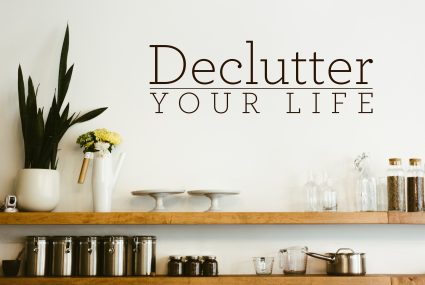Minimalism is making a comeback these days and decluttering is a trend that everyone seems to be excited about. It’s a good thing, since many people experience anxiety and stress related to being surrounded by too much stuff.
Decluttering has been shown to improve mental well-being, and that probably has a lot to do with the fact that life is just more enjoyable when we surround ourselves with things that make us happy. Decluttering is more than just a trend, though. It’s an important step for all seniors to take, as it can also have tremendous effects on overall health and well-being.
Improved mobility in your home
When you reduce the amount of “stuff” you have in your home ultimately allows you to set up your space properly to ensure it’s easy to get around. If you remove clutter in high-traffic areas, you get rid of potential tripping hazards and can dramatically reduce the chances of falls and other injuries. This is especially important for seniors who live alone or without in-home support.
Make it easier on your brain
It’s easy for anyone to lose track of things in a cluttered space. Many seniors naturally find themselves prone to misplacing or losing items more frequently as they age. This becomes especially difficult for those who suffer from memory impairment from conditions such as dementia. Reducing clutter can make life much easier and less confusing for those with memory issues. After all, if you have fewer things in your home in general, it’s a lot easier to keep track of them of them all.
Keep What Matters Most to You
When you begin the decluttering process, it can be quite emotional and often confusing. It’s sometimes really hard to know what to keep and what to get rid of. A good rule of thumb is to keep only what matters most to you. This could be for both sentimental items and for practical items too. Here are a few tips to follow when it comes time to tackle your decluttering project.
Reduce your paper trail
Many people feel the need to keep every receipt and bill they get. While this can be important to do, it’s equally as important to make sure you sort through them regularly and only keep what you need. Throw any junk mail into the recycling bin right away so it doesn’t pile up. File away your paper bills as needed, but make sure you keep them organized and throw them out once you no longer need them. If possible, make the swap to electronic bills to reduce paper waste and make it easier to keep track of them if you need them later.
Clean out your closets
For people of all ages, closets seem to be the place where clutter builds up the fastest. When it’s time to sort through your clothes, shoes, and accessories, try to stick to the 12 month rule: if you haven’t worn or used an item in the past year, ask yourself if you really need to keep it. Of course, there may be some items of sentimental value that this doesn’t apply to, but for the most part it’s an easy rule to follow.
As you work through each closet in your home, set aside any unwanted items. It’s a good ideal to have family members or friends to help you sort everything. (Who knows, they might want to keep something that you plan to get rid of!) Anything left in the piles can be donated to a local charity.
Clear out those kitchen cupboards
The kitchen is another area of the home that is prime territory for clutter to accumulate. As people get older, they often find that they don’t cook as much or stick to simpler meals. In this case, there are probably plenty of items in the kitchen that just don’t get used anymore. Sort through every drawer and cupboard and toss items you never use. It’s also a great time to sort through your pantry and get rid of any expired food items such as canned goods, dry goods, and spices.
Leave the mementos for the end
Once you’ve gotten into a bit of a decluttering groove, you might find yourself ready part with items that have some sentimental value. When you sort through these items, it’s always an emotional process and is the most difficult part of the decluttering process. When you sort through these items, use the method made famous by decluttering expert Marie Kondo: hold or touch each item and ask yourself if it brings you joy. If the answer is yes, hang onto it! If the answer is no, it might be time to finally let it go.

Comments